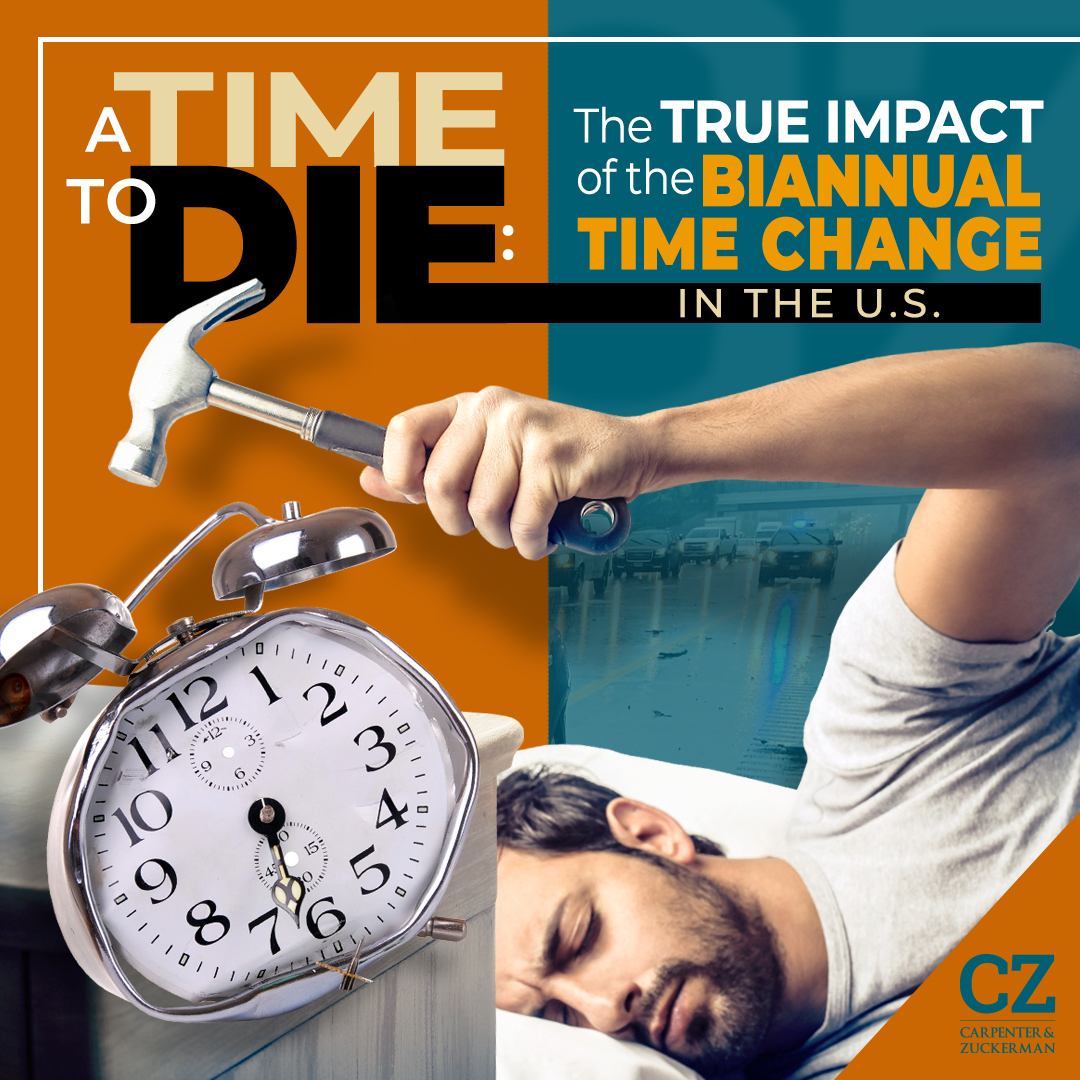A Time to Die: The True Impact of the Biannual Time Change in the U.S.
The research is clear: our country’s years-long tradition of switching the clocks by an hour each spring and fall is killing us. Numerous research studies have shown a sudden spike in heart attacks in the 24-hour period after the spring time change, as well as increases in strokes, workplace injuries, mood disorders, and car accidents.
Were you involved in a motor vehicle accident after a daylight saving time transition? It is possible that the disruption in normal sleep patterns contributed to your accident — due to impaired alertness, reaction time, or judgment in yourself or the other driver.
Perhaps you were injured in a slip and fall incident at a retail store. Lack of sleep due to the time change may have contributed to your injury through reduced alertness. Alternatively, a sleep-deprived employee responsible for store maintenance may have failed to notice and mop up a spill on the floor, resulting in your injury.
Did you experience an assault in the weeks following a time change? Mood disturbances are a documented effect of sleep deprivation and could be partially to blame in cases of assault.
In each of these situations, another party could potentially be at-fault or share liability for your accident or injury. The Law firm of Carpenter & Zuckerman has been fighting on behalf of injury victims for more than 27 years. If you were injured as a result of someone else’s negligence, even partially, you may be entitled to seek compensation for the damages you incurred, including your medical costs, lost wages, property damage, as well as pain and suffering.
To speak with a skilled personal injury law specialist, call (888) 484-2033 or Contact CZ Law today for a FREE consultation.
Switching the Clocks Linked to Death & Injury: Is it Time for a Change?
Daylight Saving Time has a long and wavering history in the United States. Originally enacted during World War I between 1918 and 1919, the practice was instituted again during World War II as a means of conserving energy. In 1966, Congress passed The Uniform Time Act, making daylight saving time consistent throughout the nation. Currently, 48 out of 50 states observe the biannual changing of the clocks, with Hawaii and Arizona declining to participate. However, a growing body of scientific research indicates that changing our clocks twice a year has measurable negative impacts on public health and safety, including:
- The spring time change has been linked with a 6% increase in the risk of fatal motor vehicle accidents, according to a Current Biology research article.
- “The incidence of acute myocardial infarction was significantly increased for the first 3 weekdays after the transition to daylight saving time in the spring,” according to an article published in The New England Journal of Medicine in 2008.
- Ischemic stroke hospitalizations increased during the first two days after daylight saving time transitions, based on a research study published in Sleep Medicine.
- Mood disorders and suicide rates temporarily increase after the spring daylight saving transition, according to the American Academy of Sleep Medicine. Specifically, research reveals that “the sleep disruptions during the spring transition cause the suicide rate to rise by 6.25 percent.”
In an official position statement on daylight saving time, the American Academy of Sleep Medicine states: “The U.S. should eliminate seasonal time changes in favor of a national, fixed, year-round time. Current evidence best supports the adoption of year-round standard time, which aligns best with human circadian biology and provides distinct benefits for public health and safety.”
Why Does the Time Change Impact Accident and Injury Rates?
Researchers in the study examining the spike in heart attacks and the shift to daylight saving time proposed that the higher incidence of heart attacks was linked to sleep deprivation. According to the American Academy of Sleep Medicine, the human body is best suited for sleep timed with the human body’s circadian rhythms. When the body’s natural circadian rhythms are disrupted, the negative effects can have disastrous consequences — both in the short and long term.
According to a research study on the National Institute of Health website, the scientifically-documented effects of sleep deprivation include:
Short-term Effects of Sleep Deprivation
Heightened responsivity to stress
Physical pain
Lowered quality of life
Emotional distress and mood disturbances
Cognitive, memory, and performance issues
Reduced school performance, psychosocial issues, and increased risk-taking behaviors in adolescents
Behavioral problems and lowered cognitive functioning in children
Long-term Effects of Sleep Deprivation
Hypertension
Abnormal lipid levels in the blood
Cardiovascular disease
Weight gain and associated issues
Metabolic abnormalities
Type 2 diabetes
Cancer, particularly colorectal cancer
Death, especially in men
Beating the Clock: How to Prevent Time Change-Related Injuries
A significant body of scientific research shows that minor disruptions to human sleep patterns and circadian rhythms can have negative consequences on cognitive functioning. As such, use the following tips to help prevent unnecessary accidents in the weeks following the biannual daylight saving transitions, particularly in the spring:
Plan ahead to get adequate sleep - Adjust your routine and get to bed earlier in the days preceding the spring time change, to ensure your body has time to acclimate and replace the extra hour of sleep you will lose.
Exercise caution when driving - Remember that your own alertness, reaction time, and cognitive functioning may be impaired, and the same is true for other drivers on the road.
Give yourself a break - Take a few minutes to rest, if necessary. Whether at work or on the road, it is better to stop and take a break than to risk an accident — for your own safety and the safety of those around you.
Seek help if you need it - Mood disturbances and increased suicides are a documented effect of the spring time change. If you need help, speak to a therapist or call the National Suicide Prevention Lifeline at 800-273-TALK (8255).
For specific tips on preventing dangerous sleep deprivation associated with the daylight saving time transitions, visit the American Academy of Sleep Medicine.
What’s the Hold-up? Changing Federal Law Is More Than A Matter of Time
Daylight Saving Time was officially made law with the passage of the Uniform Time Act by Congress in 1966. In 2018, California voters passed Proposition 7, which authorized a permanent switch to year-round daylight saving time. In order to be enacted, the State Senate must pass the legislation with a two-thirds vote. However, a vote has yet to take place, due to the fact that the federal government reserves the power to enact year-round daylight saving time.
Federal bill S.623, known as The Sunshine Protection Act of 2021, passed the Senate on March 15, 2022; however, the bill’s official status has been “held at the desk” at the House of Representatives since March 16, 2022. Why has the bill been stalled in the House? The problem lies in the fact that different interest groups have conflicting views on the solution.
Certain groups favor keeping the biannual time change unaltered; other groups, such as the American Academy of Sleep Medicine prefer to do away with daylight saving time altogether, adopting a standard time year-round; while a group united by Senator Marco Rubio of Florida under the rallying cries of “ditch the switch” and “lock the clock,” are lobbying to extend daylight saving time permanently.
U.S. Representative Frank Pallone, Jr. of New Jersey explained that the House has more pressing issues to attend to, and until lawmakers agree on which option makes the most sense, the bill will likely remain stalled. “We continue to try to come up with a consensus but so far, it’s eluded us.”
When It’s Time for Legal Advice: Call CZ Law For Help!
The experienced personal injury lawyers at CZ Law are fiercely dedicated to the protection of innocent injury victims’ rights. Our firm was founded with the purpose of holding corporations, entities, and individuals accountable when their negligent actions injure innocent victims. We consistently fight until we secure the maximum compensation possible for our clients, including reimbursement for their medical bills, lost wages, emotional pain and suffering, and property damage.
CZ Law has been fighting on behalf of injury victims for over 27 years. During that time, we have secured in excess of $2 billion in verdicts and settlements for our deserving clients. CZ Law maintains offices throughout California and Washington, including Beverly Hills, Los Angeles, Garden Grove, San Diego, Bakersfield, and Seattle.
If you have been injured in an accident, whether or not it was related to a daylight saving time transition, contact the accomplished personal injury attorneys at Carpenter & Zuckerman today. In all times and seasons, CZ Law is equipped and ready to fight for justice on your behalf. Call the law offices of Carpenter & Zuckerman today at (888) 484-2033, or fill out our contact form for a FREE case evaluation.


